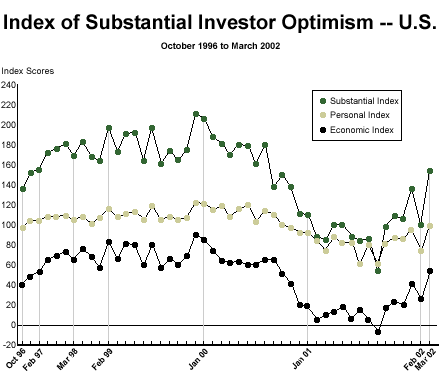New Gallup/UBS "Index of Investor Optimism -- U.S." poll data* (March 1-14) show overall U.S. investor optimism surged to 121 in March -- up 29 points from February's reading of 92 -- its highest level in more than a year. Combined with the other positive economic news of recent weeks, this new economic indicator adds significant support to the Federal Reserve's Feb. 19 claim that the U.S. economy is "expanding at a significant pace."
At the same time, the unusual volatility of the Index during recent months also suggests that the current economic recovery is extremely fragile. The American investor continues to be highly concerned about a number of potential situations that could seriously affect the investment/business climate during the months ahead. The data simply show that good news about the U.S. economy dominated investor perceptions in January and March, resulting in sharply higher investor optimism. Conversely, concerns about "Enronitis" clearly sent investor optimism plunging in February.
Given the obvious susceptibility of investor/consumer optimism to a wide range of potentially significant situations, it may be premature for the Fed or anyone else to be contemplating interest rate increases. Relatively weak retail sales in February suggest that economic reality has yet to catch up with investor/consumer optimism. Accordingly, business decision makers should enjoy the good signs for the economy that are now appearing, but be cautious as they plan for the second half of 2002.

Greatest Volatility Among Substantial U.S. Investors
Importantly, the volatility in optimism among "substantial" U.S. investors -- those with $100,000 or more of investable assets -- has been even more pronounced than it has been among U.S. investors as a whole. Overall optimism among substantial investors fell from 135 in January to 99 in February, and then soared to 155 in March. The personal dimension for substantial U.S. investors fell from 95 in January to 74 in February, before rising to 100 in March. Similarly, the economic dimension declined from 40 in January to 25 in February, before increasing to 55 in March. Volatility among these investors is particularly notable because they represent the most predictive element of the Index.
Hurting a Lot
As part of the "Index of Investor Optimism -- U.S." survey, Gallup asked investors whether they think several situations are hurting the investment climate in the U.S. They told Gallup:
- More than half of U.S. investors (52%) said that the issue of questionable accounting practices in business is hurting a lot, while another 29% said it is hurting a little.
- Three out of 10 investors (30%) said that the war on terrorism is hurting a lot, while another 27% said it is hurting a little.
- One out of four investors (26%) said that the conflict between the Israelis and the Palestinians is hurting a lot, while another 37% said it is hurting a little.
- One out of five investors (19%) said that the general economic conditions in the U.S. are hurting a lot, while another 40% said they are hurting a little.
- One out of eight investors (13%) said that the economic problems in Japan are hurting a lot, while another 45% said they are hurting a little.
- One out of 20 investors (5%) said that the Fed's current interest rate policy is hurting a lot, while another 12% said it is hurting a little.
*Results are based on interviews with 1,004 U.S. investors, age 18 and older, conducted March 1-14, 2002. For results based on this sample, one can say with 95% confidence that the maximum error attributable to sampling and other random effects is ±3 percentage points. In addition to sampling error, question wording and practical difficulties in conducting surveys can introduce error or bias into the findings of public opinion polls.
